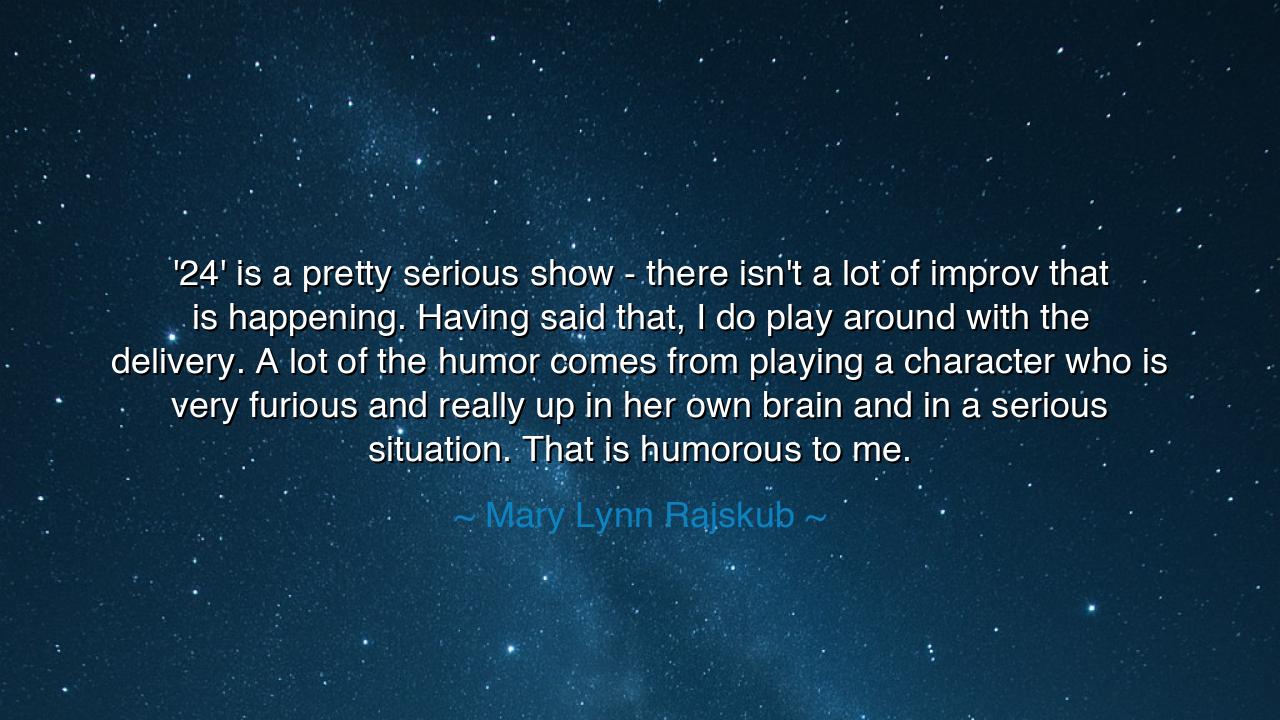
'24' is a pretty serious show - there isn't a lot of improv that
'24' is a pretty serious show - there isn't a lot of improv that is happening. Having said that, I do play around with the delivery. A lot of the humor comes from playing a character who is very furious and really up in her own brain and in a serious situation. That is humorous to me.






When Mary Lynn Rajskub said, “‘24’ is a pretty serious show—there isn’t a lot of improv that is happening. Having said that, I do play around with the delivery. A lot of the humor comes from playing a character who is very furious and really up in her own brain and in a serious situation. That is humorous to me,” she spoke of a paradox known since the dawn of art: that humor often dwells within seriousness, that laughter sometimes blooms most brightly in the shadow of tension. Her words reveal not a contradiction, but a hidden harmony—the understanding that comedy and gravity are siblings, born of the same human spirit that seeks meaning in both the tragic and the absurd.
In the show “24,” Rajskub’s character lives in a world of chaos, urgency, and high-stakes drama. Yet within that storm, she finds a flicker of humor—not through jokes or improvisation, but through truthful intensity. The humor does not arise from mocking the situation, but from the raw humanity of it. A person so lost in their fury, so tangled in their thoughts, becomes ironically—and beautifully—funny, because we recognize ourselves in that state. This is the humor of reflection, not ridicule. It is the laughter that comes when we glimpse our own folly amid our seriousness.
The ancients knew well that such humor is sacred. Aristophanes, the great playwright of Greece, often placed laughter in the midst of turmoil. His comedies mocked the powerful and the proud, not merely to amuse but to reveal truth. In his laughter, there was always a deeper current—a recognition of how humans, in their seriousness, often stumble into absurdity. In Rajskub’s insight, we see the same wisdom: when a soul becomes consumed by its own storm, there lies a quiet comedy, the divine reminder that even in the grand theater of crisis, we are still fragile, still human, still capable of smiling at our own intensity.
Consider also the story of Winston Churchill, who carried the weight of a world at war upon his shoulders. He was famed for his iron will, his grave speeches—but equally for his wit. When asked how he could joke in the midst of destruction, he replied that humor was the armor of the brave. Like Rajskub, he found that in the furnace of seriousness, laughter becomes not folly, but strength. It is the soul’s way of bending without breaking. It is the ability to see beyond the immediate fire, to remember that no matter how dire the moment, the spirit must still breathe.
Rajskub’s words teach that even when life demands seriousness—when there is “no room for improv,” no time for play—we may still find room for interpretation, for delivery, for the subtle art of grace within constraint. Her humor arises not from chaos, but from control; not from jest, but from presence. This is a lesson for all who walk through the narrow roads of duty, labor, and expectation: within even the most rigid structures, there is a space where the soul can play. To find it is to master both discipline and joy.
This is not the humor of mockery, but the humor of understanding. It is the quiet smile one gives when realizing how small our tempests are in the vast sea of existence. It is the kind of laughter that philosophers called sublime—a laughter that frees, that releases tension without destroying meaning. To laugh thus is to balance the heart: not to trivialize seriousness, but to keep it from consuming us. It is to say, “I see the storm, I feel the weight—but I also see the light glimmering through it.”
So, my listener, learn from this: when your life grows rigid, when you are lost in fury or buried in thought, remember the wisdom of Mary Lynn Rajskub. Find the humor within the seriousness. Let it not be foolish laughter, but the laughter of recognition. Do not force levity upon solemn things—but see the gentle absurdity of your own human struggle and let it soften you.
For the wise know that humor is not the enemy of seriousness—it is its companion, its balance, its breath. To live well is to hold both intensity and laughter in the same heart, as flame and wind dwell together to keep the fire alive. When you can smile even while you labor, when you can see yourself clearly in your fury and still forgive it—that is mastery. That is art. And that, dear soul, is the ancient secret of laughter that truly makes sense.






AAdministratorAdministrator
Welcome, honored guests. Please leave a comment, we will respond soon